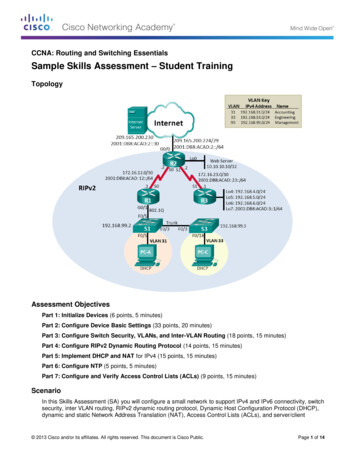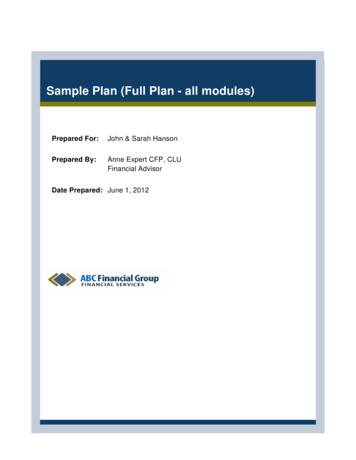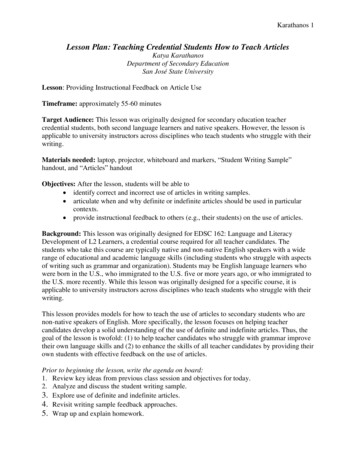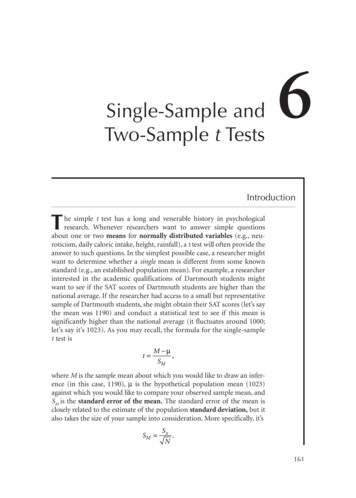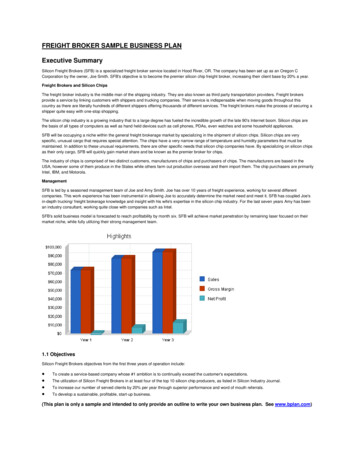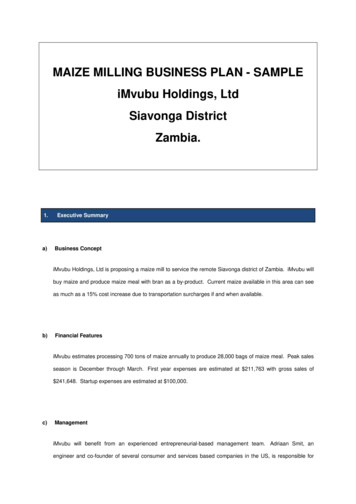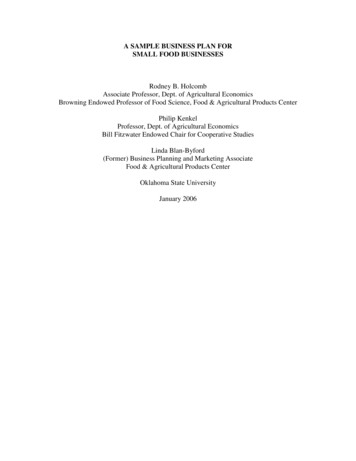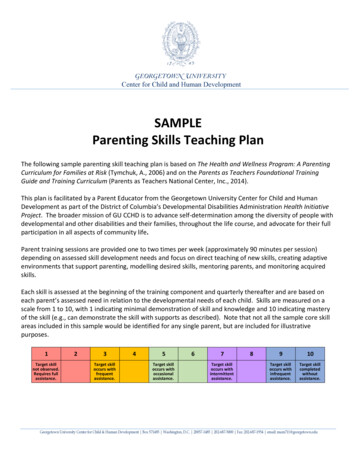
Transcription
Center for Child and Human DevelopmentSAMPLEParenting Skills Teaching PlanThe following sample parenting skill teaching plan is based on The Health and Wellness Program: A ParentingCurriculum for Families at Risk (Tymchuk, A., 2006) and on the Parents as Teachers Foundational TrainingGuide and Training Curriculum (Parents as Teachers National Center, Inc., 2014).This plan is facilitated by a Parent Educator from the Georgetown University Center for Child and HumanDevelopment as part of the District of Columbia’s Developmental Disabilities Administration Health InitiativeProject. The broader mission of GU CCHD is to advance self-determination among the diversity of people withdevelopmental and other disabilities and their families, throughout the life course, and advocate for their fullparticipation in all aspects of community life.Parent training sessions are provided one to two times per week (approximately 90 minutes per session)depending on assessed skill development needs and focus on direct teaching of new skills, creating adaptiveenvironments that support parenting, modelling desired skills, mentoring parents, and monitoring acquiredskills.Each skill is assessed at the beginning of the training component and quarterly thereafter and are based oneach parent’s assessed need in relation to the developmental needs of each child. Skills are measured on ascale from 1 to 10, with 1 indicating minimal demonstration of skill and knowledge and 10 indicating masteryof the skill (e.g., can demonstrate the skill with supports as described). Note that not all the sample core skillareas included in this sample would be identified for any single parent, but are included for illustrativepurposes.1Target skillnot observed.Requires fullassistance.23Target skilloccurs withfrequentassistance.45Target skilloccurs withoccasionalassistance.67Target skilloccurs withintermittentassistance.8910Target skilloccurs withinfrequentassistance.Target skillcompletedwithoutassistance.Georgetown University Center for Child & Human Development Box 571485 Washington, D.C. 20057-1485 202-687-5000 Fax: 202-687-1954 email: mam711@georgetown.edu
Core Skill Home Safety andPreventionCommon ChildHealth Problemsand EmergenciesDecision-MakingGoals of Training1. Establish ageappropriate eveningroutines for children2. Promote use of ageappropriate discipline3. Establish routine use ofpraise4. Provide supportivedirections andexpectations1. Engage child in ageappropriateconversations2. Respond to child’swords, sounds, babbling 1. Recognize child’sbehavioral cues2. Console child whenupset3. Allow child to makesafe mistakes withoutcriticism4. Use positive behavioralsupports1. Support a safeenvironment2. Maintain safetyguidelines3. Establish escape routefrom home/apartment 1. Recognize commonhealth problems2. Appropriately usehealth materials &administer medications1. Recognizeconsequences ofchoices2. Practice good decisionmaking Training SupportsProvidedVisual schedulepresented by parenteducator & used byparentModel and practicewith parentSticker board &reward systemModel and practicewith parent educatorModel and practicewith parent educatorUse of verbalprompts with fadingBy parent educatorand support staffModel and practicewith parent educatorVerbal prompts withfadingPicture basedreminder used withsupport from staffBaselineRating2CurrentRating91818Install environmentalsafeguardsMonitor home safetyVisual checklist ofsafety routinesVisual escape planPicture basedsymptom chartModel and practicewith parent educatorVisual reminderswith support fromstaffModel and practicegood decisionmaking with parenteducator2104936Georgetown University Center for Child & Human Development Box 571485 Washington, D.C. 20057-1485 202-687-5000 Fax: 202-687-1954 email: mam711@georgetown.edu
Core Skill AreaNurturingRespondingFinancialManagementGoals of Training1. Celebrateaccomplishments andefforts with child2. Balance attention to allchildren3. Allow child to make safemistakes withoutcriticism1. Incorporate individualtime with oldestdaughter1. Positively respond tochild cues2. Support child’sexpression of ideasCalmly respond to highstress situations1. Establish approaches tosaving income to supportvisitation with sons Multi-generational2. Managing dynamicsassociated with amultigenerational family Co-parenting1. Establish appropriaterelationship with coparent2. Collaborate with coparent on all facets ofparenting1. Demonstrate basicmoney skills Financial Literacy Training SupportsProvidedModel and practicewith parent trainerVisual calendars toschedule time withall childrenBaselineRating6CurrentRating10Model and practiceplay activities withparent trainerCreate visualschedule with goalsRole-playDevelopment of abudgetEstablishment of abiweekly savings planModel and practicerelaxation techniquesand positivecommunicationstrategiesRole-play goodcommunication skillsModel and practicewith parent educator37143526Counting play moneyVisual chart of billequivalentsUsing sale circulars todemonstrate the costof items in billsMaking appropriatechange05Georgetown University Center for Child & Human Development Box 571485 Washington, D.C. 20057-1485 202-687-5000 Fax: 202-687-1954 email: mam711@georgetown.edu
SAMPLE Summary of Parenting Skill ProgressThe following is a sample quarterly progress report that aggregates scores of assessed parenting skills for allparents receiving parenting teaching supports provided by the Georgetown University Center for Child andHuman Development as part of the District of Columbia’s Developmental Disabilities Administration HealthInitiative Project.Parent Skill Progress .00.0Key MetricsTotal Number of Parents Assessed36Average Baseline Rating3.4Average Current Rating7.6Average Improvement69%Average Length of Skill Training9 monthsGeorgetown University Center for Child & Human Development Box 571485 Washington, D.C. 20057-1485 202-687-5000 Fax: 202-687-1954 email: mam711@georgetown.edu
Parenting Skills ChecklistCheck Any That Apply. The results of this screening can be used for tailoring person-centered parent teaching plans and ratingobserved skill level.Preconception – Parent RolePreconception – Service Agency RoleChoose a primary care providerNursing assessment identifies areas of support needParticipate in regularly scheduled appointmentsModel responsible behaviorLearn about sexual health issuesAssess learning needsPlan for beginning a familyReinforce learningPractice safe sexOffer support to schedule and keep medical appointmentsEnroll in identified public benefit programsAssist in enrollment in identified public benefit programsPrenatal – Parent RolePrenatal – Service AgencyAttend all obstetric appointmentsAssist in planning for arrival of baby, including budgetingFollow the recommendations of the doctor, midwife or NPReinforce learningLearn how to take care of yourselfOffer emotional supportPrepare for the arrival of the babyOffer support to schedule and keep medical appointmentsEnroll in identified public benefit programsAssist in enrollment in identified public benefit programsNewborn – Parent RoleNewborn – Service AgencyLove your baby and talk to your babyObserve for any problem areas (i.e., fussy baby, post-partum)Learn about your baby’s habitsAssist in developing a picture schedule of baby careSleep when you can and eat food that is good for youOffer support to schedule and keep medical appointmentsLearn to ask for helpAssist in enrollment in identified public benefit programsEnroll in identified public benefit programsInfancy – Parent RoleInfancy – Service AgencyLearn safety skillsReinforce good parenting skillsTake the baby to all scheduled well-child checksAssist parent in creating a workable scheduleMeet other parents of young childrenAssist parent to identify community resourcesTake the baby to activities at the libraryOffer support to schedule and keep medical appointmentsObserve for safe environmentsAssist in enrollment in identified public benefit programsEnroll in identified public benefit programsGeorgetown University Center for Child & Human Development Box 571485 Washington, D.C. 20057-1485 202-687-5000 Fax: 202-687-1954 email: mam711@georgetown.edu
Toddler & Preschool – Parent RoleToddler & Preschool – Service Agency RoleEnroll your 3-year-old in DCPS pre-schoolReinforce good parenting skillsContinue with enrichment activitiesAssist parent in creating a workable scheduleSeek help to maintain loving disciplineAssist the parent in creating a workable schedulePlan activities for out-of-school timeOffer support to schedule and keep medical appointmentsObserve for safe environmentsAssist in enrollment in identified public benefit programsEnroll in identified public benefit programsSchool Age – Parent RoleSchool Age – Service Agency RoleSelect the best school for your childObserve for safe environmentsMeet your child’s teacher and learn how to communicateReinforce good parenting skillsBe sure your child is prepared for schoolContinue with a daily scheduleLearn about the resources available to assist youAssist parent with interaction with school personnelLearn about what happened during your child’s dayOffer support to schedule and keep medical appointmentsPrepare for the next school dayAssist in enrollment in identified public benefit programsFind summer programsEnroll in identified public benefit programsTeen Years – Parent RoleTeen Years – Service Agency RoleTake a deep breath!Respect the parent’s decisionFind ways to communicate with your teenKnow referral sources that provide emotional guidanceCreate balance about providing appropriate privacyBe familiar with community resources for teensAssist them in enrolling in after-school activitiesBe prepared to listen to teen, but do not contradict parentMonitor their school workAssist parent in guiding the teen in post-secondary pursuitsSeek assistance from othersOffer support to schedule and keep medical appointmentsEnroll in identified public benefit programsAssist in enrollment in identified public benefit programsUniversity Center for Excellence in Developmental Disabilities Box 571485 Washington, D.C. 20057-1485 202-687-5000 Fax: 202-687-1954 email: gucdc@georgetown.edu
Visual calendars to schedule time with all children 6 10 Responding 1. Positively respond to child cues 2. Support child’s expression of ideas Calmly respond to high stress situations Model and practice play activities with parent trainer Create visual schedule with goals Role-play 3 7 Financial Management 1. Establish approaches to saving income to support visitation with .


